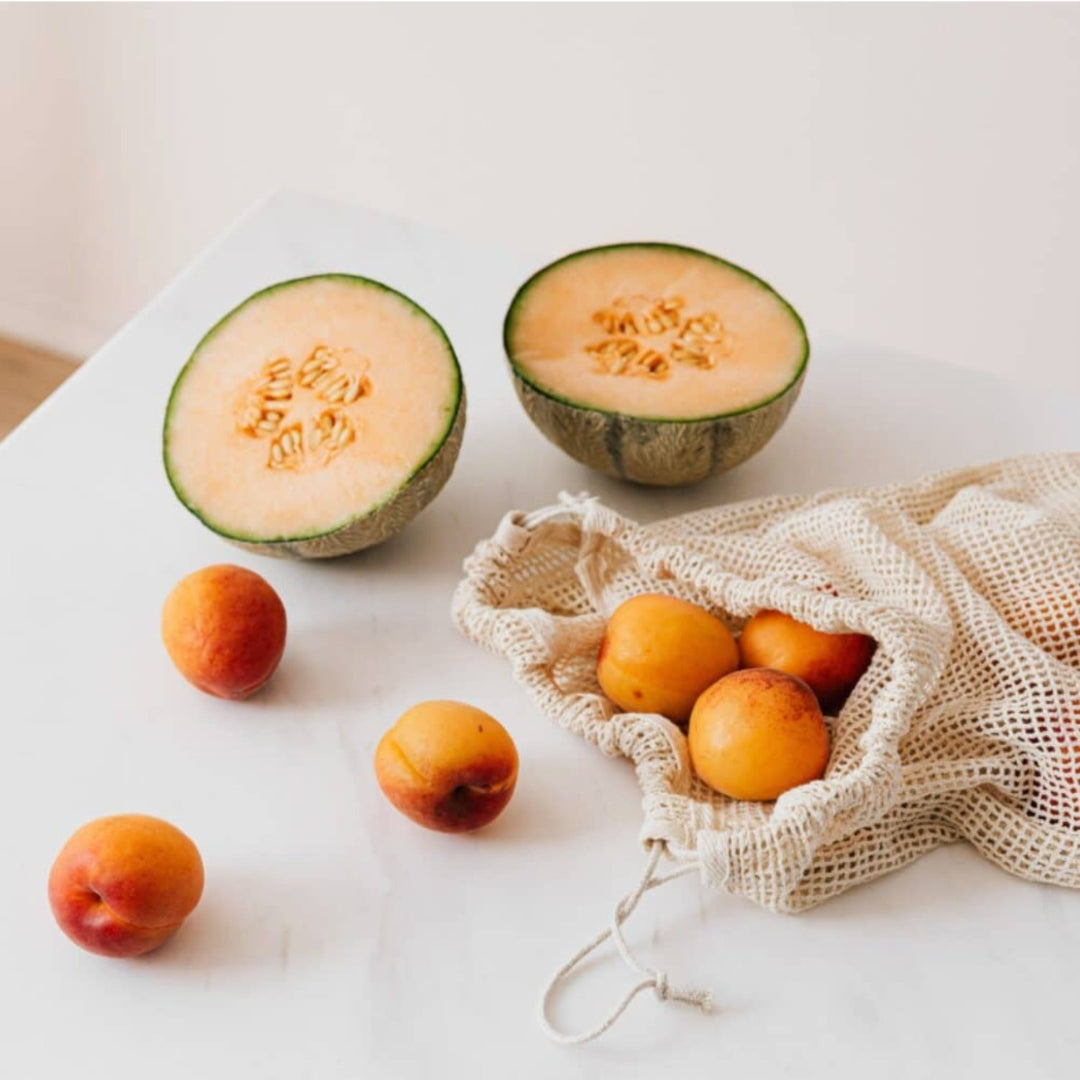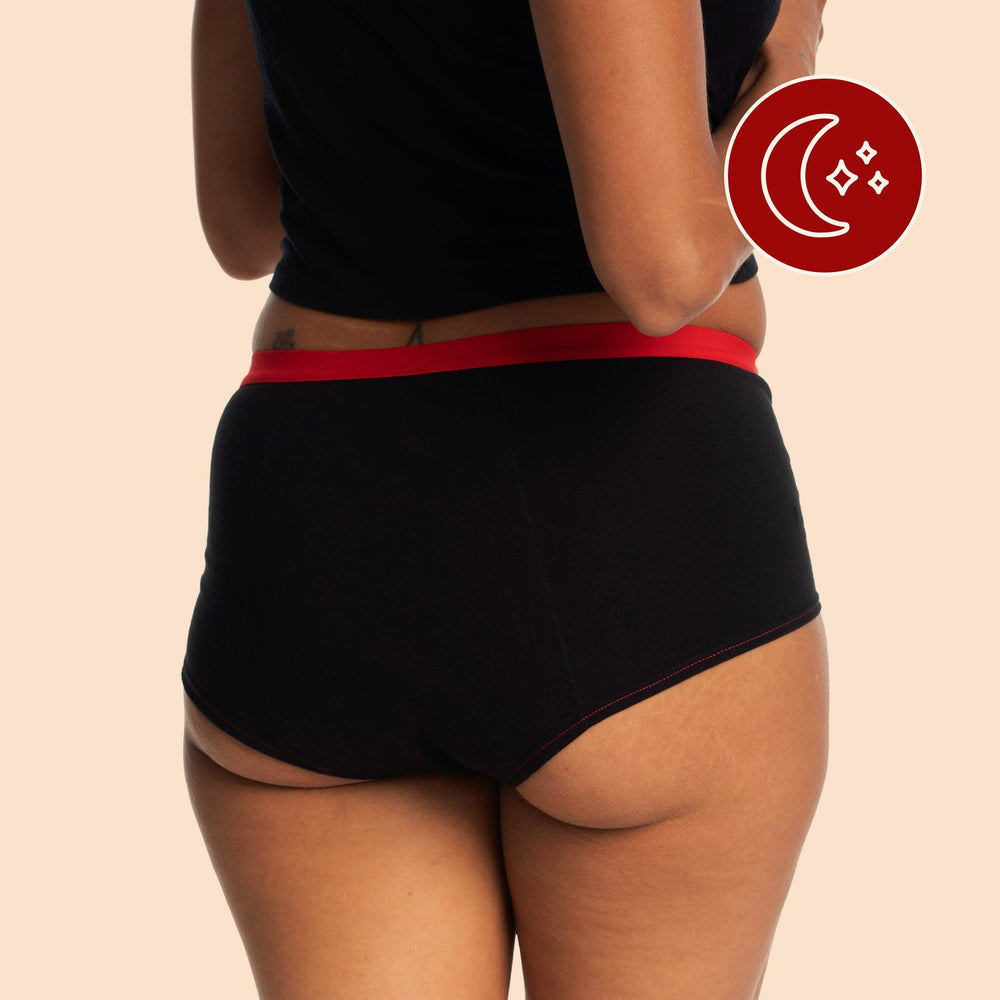Menopause... it's infamous
Menopause. Whenever we hear that word, we think of hot flashes and old age. And we often forget about all the beautiful things that define such a huge step in our lives. We also forget to remind ourselves that there's a transitional period leading up to menopause – perimenopause – which can last for 5 to 10 years and come with a whole lot of ups and downs itself!
In the collective imagination, menstruating people are too often seen as howling with the wolves under a full moon before going into menopause and soaking themselves in a bathtub full of rose petals and wisdom. Yes, our menstrual cycles contain an incredible power. But it's important to be aware that we can also suffer at the hands of our hormones – and that suffering is often endured in silence. Sarah's on a mission to break that silence.
Sarah Rodrigue
Although she's got a background in political silence, Sarah Rodrigue long ago remade herself into a blogger, event coordinator, and columnist. She's also the bestselling author of “Maudites Hormones,” which means "Damn Hormones" in English. Having struggled for years with two extreme hormonal disorders – premenstrual dysphoric disorder and endometriosis – she wanted to give home to other people who menstruate. She wanted to remind them they're neither alone nor crazy.
Perimenopause and menopause: The symptoms
Okay, I admit it. Talking about symptoms can be a bit dull, but they're hugely important! Putting our fingers on exactly what we're feeling is a real game changer. We learn that what's going isn't because of some fault in our personalities, our partners, our jobs, our kids...nope. None of that. What's going on is HORMONAL! The power of our hormones is unimaginable, and it's something we frequently underestimate.
“Just because it's natural doesn't mean we live it naturally well.” - Sarah Rodrigue (something she finds herself repeating pretty often).
Perimenopause: The transitional stage
Perimenopause is the transitional period we experience before menopause. It starts when we're around 42 to 45 years old, and it's characterized by changes in our hormone production levels. Generally speaking, we know perimenopause is rolling out its red carpet when our menstrual cycles get shorter and our periods get heavier – but don't forget that we're all unique!
Menopause: More than just hot flashes
Menopause starts when we've gone 12 consecutive months without having our period. We know it's rearing its head when we start skipping cycles, which usually happens when we're around 53 years old.
And some of us will experience more difficult symptoms than others. Eighty percent of people who menstruate get the infamous hot flashes – they're the most common symptom. Those spontaneous squalls usually come with anxiety; our mascara runs and our clothes get soaked in sweat...nothing too cool about that! Go through a flash or two, and it's suddenly pretty easy to understand why our mothers complained about them so often. They're intense!
→ Tip: Bring a hand fan with you, press ice cubes against your skin, and wear layers!
Apart from hot flashes, you might experience some of these other totally normal, totally common symptoms: mood swings, irritability, difficulty managing stress, difficulty sleeping, difficulty focusing, depression, reduced sex drive, wrinkles, dry hair, hair loss, migraines and headaches, and sore muscles. If things get too rough, don't hesitate to see a doctor.
Over the long term, menopause makes us naturally more susceptible to osteoporosis, urinary incontinence, and cardiovascular issues.
Beyond physical symptoms: Mental impacts
Generally speaking, if menopause doesn't come calling while our kids still live at home, it starts pounding on the front door just when we're about to switch our focus from our families to our careers. In both cases, it can bring huge changes to how we think and feel, and it's important to be aware of that.
There are also cultural factors to keep in mind. In North America, the way society devalues people going through this stage of life only adds to the burden. That's why we have to try extra hard to be gentle on ourselves.
But how can we reclaim some power over our bodies and souls?
Honouring our natural cycles
It goes without saying that we who menstruate operate on a cycle – our menstrual cycles. In a patriarchal society obsessed with linearity, Cartesian and performance-driven at all costs, taking care of ourselves can be hard, and so can knowing what's right for our own bodies.
Can't we find some way of living through perimenopause and menopause ourselves?
While we see echoes of our natural cycles in the changing of the seasons and phases of the moon, the economy is pretty much bereft of anything similar. Taking care of ourselves means reclaiming power over our bodies and questioning a system that doesn't always jive with our needs.
Having compassion for ourselves
Try and listen to how you talk to yourself. Are you treating yourself like a friend? It's important that you hear a friendly little voice. Is it critical? Does it devalue you? Does it tell you to ignore rising emotions?
Sarah blamed herself so much for her hormonal issues. And the guilt didn't just come from her own heart – it came from a whole society committed to telling her she wasn't a productive member, that she wasn't a good mother or partner.
Having compassion for ourselves means remembering that none of this is our fault when we're suffering from perimenopause or menopause. It's not because we were mean to one of our friends in second grade. It's not karma. It's not because we haven't eaten enough kale or because we aren't sufficiently spiritual. There are all kinds of external factors: our biochemistry, the food we eat (hello, pesticides!), ever-present stress, and genetics... Ugh! Breathe in. Breathe out. Be gentle and compassionate with yourself.
Listen to your cycle
It's got all the answers when it comes to reclaiming your power. It can teach you a whole lot. Getting the tools to tap in is simple. They're accessible and once we hear what our cycle's telling us, the experience is hugely empowering.
Looking for an awesome tool? Keep a period journal to keep track of how long your cycles are and how they feel, both mentally and physically, as you go through your inner seasons.
7 helpful ways you can prep yourself for perimenopause and menopause
- Eat a healthy diet: There aren't any scientific studies on the links between diet and perimenopause, but our diets play a big role in our hormones and bodies in general.
- Black cohosh: Try this herb extract to get relief from hot flashes and irritability, but check with your doctor before taking it regularly!
- Acupuncture: You've got nothing to lose, so why not check out this gentle treatment?
- Sleep: Rest is key!
- Mindfulness: To soothe our nervous systems.
- Stress management: Perimenopause is a time to clean up and shut out our daily stressors. Stow baggage that's not doing you any good, cut off toxic relationships, and reset your priorities.
- Hormone therapy: To learn everything you need to know about hormone therapy, check out the documentary Loto-Méno. (It's in French, though!)
How can you deal with mourning the end of your cycle?
For people who think of their periods as empowering and sacred, the end of menstruation can be a difficult time. Others are really hit by the end of their child-bearing years. In a world in which femininity is largely defined by motherhood and menstruation, menopause can seem like the loss of personal power and the end of life itself. But don't despair!
Try one of Sarah's tricks: write down everything you're missing and mourning, then burn the paper! Seriously! Do it! That sheet is a symbol of everything you're mourning, and while grief is totally okay, Sarah's trick will help you get over feeling it every single day. Once you do that, you're ready for the best part, which is throwing a list-making party about all the awesome things to come!
Despite symptoms that one might call, well, difficult, menopause can also be a time of immense liberation. It's an opportunity to:
- Stoke your inner strength
- Redefine your sense of self beyond your uterus and hormones
- Say no! Don't hesitate to tell yourself, "Hey, I'm going through menopause, pal, and I don't have time for any bullshit!"
- Stop apologizing for everything
- Honour your wisdom and develop your empathy
Here's wishing you a fulfilling perimenopause and menopause!
Replay
If you want to check out the whole Red Table event online (and for free!), it's here!
Here are some resources:
- A documentary by Véronique Cloutier on menopause and available on Tou.TV (it's in French, though!): Loto-Méno
- Remember Regina, the artist who sang her Period Song at a pervious Red Table? Check out her Instagram, Tiss Cabaret
- To hear more from Sarah, check out her blog, Instagram, Facebook, and podcast
- To get Sarah's book, "Maudites Hormones", pop over to Renaud-Bray (it's in French, though!)

























